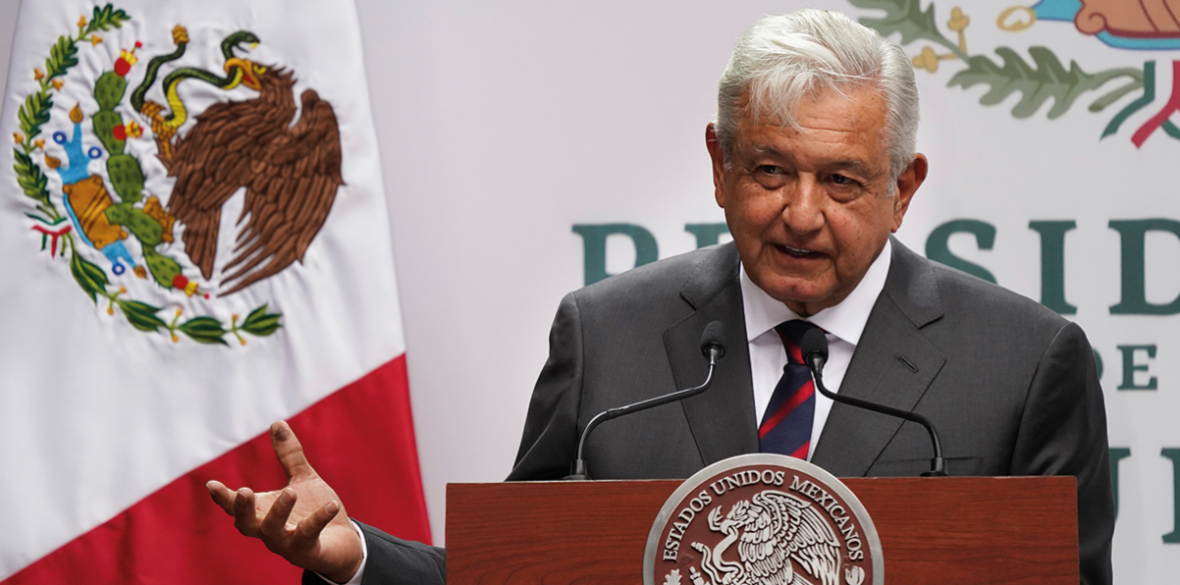This is the last article you can read this month
You can read more article this month
You can read more articles this month
Sorry your limit is up for this month
Reset on:
Please help support the Morning Star by subscribing here
THE decision by Mexican President Andres Manuel Lopez Obrador, ratified by the Mexican Congress in April, to nationalise lithium is a major step forward in the country’s economic sovereignty.
Together with his restoration of control over oil and gas by Pemex and his electric reform to ensure national control of that sector, it ensures a significant degree of political and economic independence at a crucial moment of global instability.
Mexico has no illusions of going it alone and since Amlo’s term began in December 2018 has sought Latin American co-ordination and integration.
When the issue of Mexico’s lithium deposits began to be publicly discussed in mid-2021, the president indicated that his government was taking advice from Bolivia (whose lithium nationalisation had been a key factor in the right-wing coup against Evo Morales in November 2019, with Elon Musk’s notorious boast “We will coup whoever we want”).
At the beginning of this month Mexican Foreign Secretary Marcelo Ebrard visited Bolivia to sign an ambitious agreement on a joint public enterprise for lithium industrialisation, confirming the two nations’ commitment to regional economic sovereignty.
Bolivia awarded Ebrard the Marshal Santa Cruz decoration (its highest international honour) in recognition of Mexico’s heroic action in saving Morales from almost certain death in the coup, and its steadfast support for the restoration of Bolivian democracy a year later.
Ebrard declared it was an award to the Mexican people, their government and their president.
Together with Bolivian officials, Ebrard visited the Uyuni salt lake which holds the largest deposit of brine lithium in the world, and toured the industrial complex of state company Bolivian Lithium Deposits: plants for salt processing, potassium chloride and lithium carbonate, and a pilot lithium ion battery plant. He was shown a prototype lithium-powered car designed and built in Bolivia.
The two governments confirmed their intention to create a Binational Mexican-Bolivian Lithium Institute for joint battery production.
In November Bolivia will host the first International Lithium Congress, and Latin American nations (Argentina, Chile and Peru as well as Bolivia and Mexico) will work to co-ordinate prices and marketing; together they control at least 62 per cent of the world’s lithium.
The other nations have not been able to nationalise lithium: in Chile, for instance, there was public pressure for nationalisation, and early this year as president-elect, Gabriel Boric expressed support for the idea, but outgoing right-wing president Sebastian Pinera forced through a fire-sale of the country’s deposits to private companies.
I was in Chile at the time and witnessed popular indignation at this plunder of the nation’s resources.
Mexico and Bolivia also created a Binational Trade and Investment Chamber, with 25 companies participating, and agreed to collaborate on infrastructure, food and energy self-sufficiency.
They will also strengthen their links in defence and promotion of Latin American and Caribbean unity.
Mexico’s bold lithium nationalisation was only possible because private companies had not yet taken control of the country’s vast resources of the mineral (there are a couple of companies which do have outstanding claims which are subject to litigation).
But mining in general is an enormous headache for Amlo and his progressive government.
In the 30 years before Amlo’s 2018 election, neoliberal governments gave away mining concessions on a gargantuan scale: more than half the national territory is subject to mining grants.
Gold, silver, copper, lead, uranium and many other minerals are exploited on an enormous scale by Mexican and foreign companies (Canadian capital is particularly prominent).
There is at present no legal prospect of revoking these concessions, although public opinion is against the companies and the Mexican Miners’ Union under its much-respected leader Napoleon Gomez Urrutia (now a Morena Party senator) wants more action against mining companies.
In the last three years the Miners’ Union has made important gains in wages and conditions and union recognition at several companies, and Gomez Urrutia has played a leading role in the battle for workers’ rights and union democracy in general (not just in mining).
He was particularly prominent in getting an effective law passed to ban outsourcing or subcontracting except in strictly limited circumstances, and when I interviewed him in January he declared that this was the biggest single gain for Mexican labour since Amlo’s election.
Recent disasters in several mines only underline the need for action, and while nationalisation of other minerals is not on the cards, enforcement of labour rights, safety and taxation certainly are.
The reclaiming of lithium for the nation and close collaboration with Bolivia show clearly the direction Amlo and Morena want to take, reasserting Mexican and regional sovereignty.
David Raby is a retired academic and independent researcher on Latin America. He can be reached at [email protected] and on Twitter @DLRaby.











